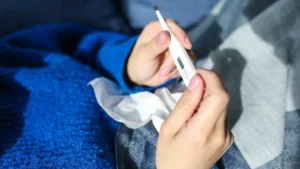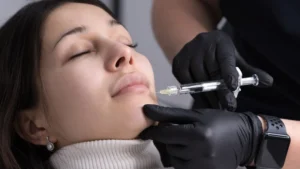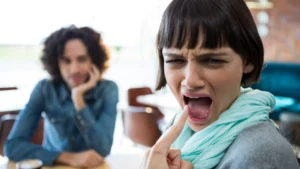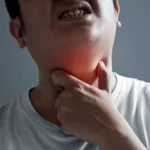When it comes to lice infestation, many people assume that only those with a full head of hair are at risk. However, the question remains: can bald people get lice? The answer may surprise you. Lice are parasitic insects that live and feed on human blood from the scalp. While they prefer to attach themselves to hair shafts, they can also survive on other parts of the scalp, including the skin. This means that bald people are not immune to lice infestation.
In fact, research has shown that bald individuals can still become hosts to lice and experience the uncomfortable symptoms associated with an infestation. In this article, we’ll explore the topic in more detail, including how lice spread, what the symptoms of infestation are, and how bald people can prevent and treat lice. So, let’s delve deeper into the question: can bald people get lice?
Can bald people get lice?
When it comes to lice infestation, many people assume that only those with a full head of hair are at risk. However, the question remains: can bald people get lice? The answer is yes, and in this article, we’ll explore the reasons why.
How Lice Spread and Survive on the Scalp
Lice are parasitic insects that feed on human blood from the scalp. They prefer to attach themselves to hair shafts, but they can also survive on other parts of the scalp, including the skin.
Lice are transmitted through direct contact with an infested person’s hair or personal items such as hats, brushes, and combs.
Research on Lice Infestation in Bald Individuals
Research has shown that bald individuals can still become hosts to lice. A study published in the Journal of Medical Entomology found that lice could survive on bald scalps for up to 24 hours.
Another study published in the International Journal of Dermatology found that bald individuals were less likely to have lice than those with hair, but still had a risk of infestation.
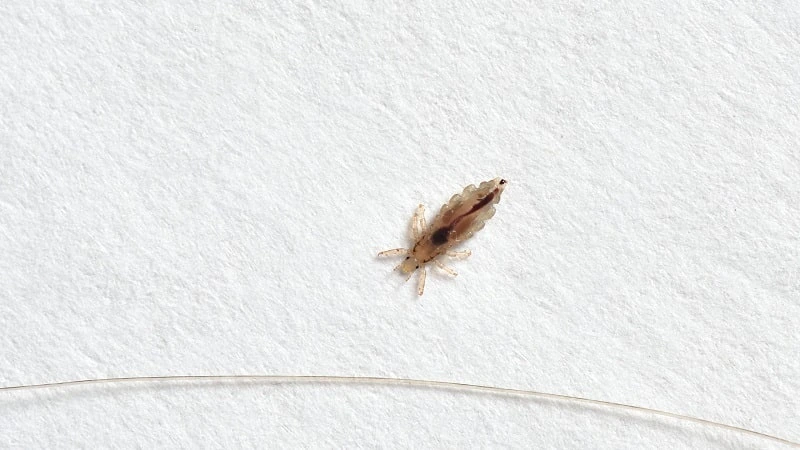
Factors that can Increase or Decrease the Risk of Lice Infestation in Bald Individuals
While bald individuals are not immune to lice infestation, some factors can increase or decrease their risk.
One factor is personal hygiene. Lice are more likely to infest individuals who do not practice good hygiene, regardless of their hair status.
Additionally, factors such as age, gender, and living conditions can affect an individual’s risk of lice infestation.
Symptoms of Lice Infestation
The symptoms of lice infestation are the same for both bald and hair-covered individuals. These symptoms include intense itching and redness of the scalp. Lice and their eggs (nits) can also be visible on the scalp or hair shafts.
Preventing and Treating Lice Infestation in Bald Individuals
Preventing lice infestation in bald individuals requires basic hygiene practices such as washing the scalp regularly with shampoo and warm water, avoiding the sharing of personal items, and regularly cleaning bedding and clothing.
If infestation occurs, treatment options include over-the-counter or prescription shampoos or lotions specifically designed to kill lice.
Read More: Remedy for Hair Fall and Hair Growth
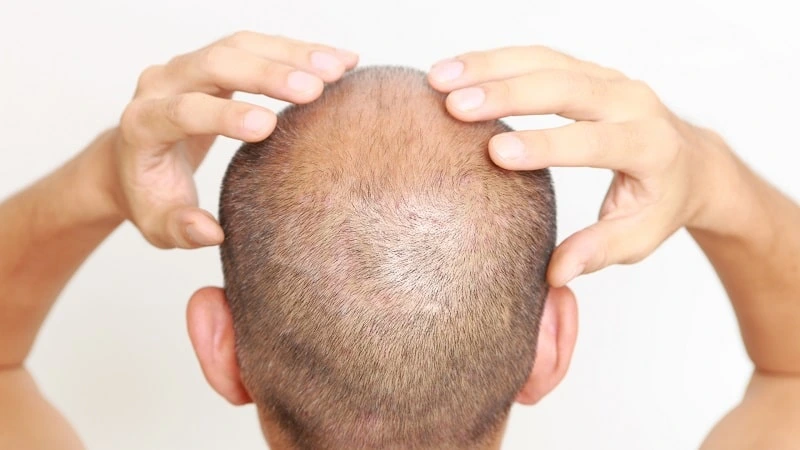
What are the symptoms of a lice infestation?
Lice infestation is a common problem that affects people of all ages, genders, and hair types. The symptoms of lice infestation can be uncomfortable and irritating, but with prompt treatment, they can be effectively managed. In this article, we’ll explore the symptoms of lice infestation in more detail.
Identification of Lice and Their Eggs (Nits)
The first step in identifying lice infestation is to check for the presence of lice and their eggs, known as nits. Lice are tiny insects that are roughly the size of a sesame seed, and they are most commonly found on the scalp, behind the ears, and at the nape of the neck.
Nits are small, oval-shaped eggs that attach to the hair shafts and are often mistaken for dandruff.
Common Symptoms of Lice Infestation
The most common symptoms of lice infestation are intense itching and redness of the scalp. This itching is caused by an allergic reaction to the saliva of the lice when they feed on blood from the scalp. The itching can be so severe that it can interfere with sleep and daily activities.
Other symptoms of lice infestation can include the presence of small, red bumps on the scalp or neck, and the feeling of movement on the scalp.
It’s important to note that while lice infestation can be uncomfortable and irritating, it does not pose a serious health risk.
Read More: Is Menopausal Hair Loss Permanent?

How can bald people prevent lice infestation?
While it is a common misconception that only people with hair can get lice, bald people can still be at risk of lice infestation.
Lice can attach themselves to the scalp, beard, or mustache hair, and even to eyebrows and eyelashes. In this article, we’ll explore how bald people can prevent lice infestation.
Maintain Good Hygiene Practices
Maintaining good hygiene practices is the first step in preventing lice infestation. This includes regularly washing the scalp, beard, mustache, eyebrows, and eyelashes with a gentle cleanser.
It’s also important to avoid sharing personal items such as hats, combs, and brushes with others.
Check for Lice Infestation
Bald people should also regularly check their scalp, beard, mustache, eyebrows, and eyelashes for the presence of lice and their eggs.
This can be done using a magnifying glass and a fine-toothed comb. If lice or nits are found, treatment should be sought immediately.
Use Essential Oils
Essential oils such as tea tree oil and lavender oil have natural insecticide properties that can repel lice.
Bald people can add a few drops of these oils to their shampoo or conditioner, or create a spray by diluting the oils with water and spraying the scalp and facial hair.

Keep Clothing and Bedding Clean
Lice can survive on clothing and bedding for up to two days, so it’s important to keep these items clean.
Bald people should wash their clothing and bedding regularly in hot water and dry them on high heat.
Avoid Close Contact with Infected Individuals
Lice are highly contagious and can spread through close contact with infected individuals. Bald people should avoid close contact with individuals who have lice and should not share personal items such as hats, combs, and brushes.
Conclusion
In conclusion, lice infestation is a common problem that can affect people of all ages and hair types, including bald individuals.
The symptoms of lice infestation can be uncomfortable and irritating, but with prompt treatment and proper prevention measures, lice infestation can be effectively managed and prevented.
FAQS
Here are some frequently asked questions about lice infestation:
Can lice infestation spread to other parts of the body?
Lice infestation is most commonly found on the scalp, but it can also spread to other areas with hair, such as the beard, mustache, eyebrows, and eyelashes.
How is lice infestation diagnosed?
Lice infestation is typically diagnosed by finding live lice or their eggs on the scalp or hair.
What are the treatment options for lice infestation?
Treatment options for lice infestation include over-the-counter or prescription shampoos or lotions specifically designed to kill lice.
Can lice infestation cause complications?
While lice infestation itself does not pose a serious health risk, scratching the scalp can lead to skin irritation and infection.
Can lice infestation be prevented?
Lice infestation can be prevented by maintaining good hygiene practices, avoiding the sharing of personal items, and regularly checking for lice infestation.
Can bald people get lice?
Yes, bald people can still be at risk of lice infestation, as lice can attach themselves to facial hair, such as beards, mustaches, eyebrows, and eyelashes.
Can lice infestation be treated at home?
Yes, over-the-counter treatments for lice infestation can be used at home, but it’s important to follow the instructions carefully and to treat all members of the household.
How long does it take for lice infestation to go away?
With proper treatment, lice infestation can typically be eliminated within two weeks.
Can lice infestation come back after treatment?
Yes, lice infestation can come back after treatment if proper prevention measures are not taken.
Does shaving head get rid of lice?
Yes, shaving the head can be an effective way to get rid of lice because it removes the hair on which lice lay their eggs. However, it is not necessary to shave the head to get rid of lice. Over-the-counter lice treatment products are also effective at killing lice and their eggs.
Do lice prefer a certain blood type?
There is no scientific evidence to suggest that lice prefer a certain blood type. Lice feed on human blood, and any blood type will suffice.
How to get rid of lice with coke?
There is no scientific evidence to suggest that coke can effectively kill lice or their eggs. It is recommended to use over-the-counter lice treatment products that are specifically designed for this purpose.
Can lice shampoo cause hair loss?
It is rare for lice shampoo to cause hair loss. However, if the shampoo is not used correctly, it can cause damage to the hair and scalp, which can lead to hair loss. It is important to follow the instructions on the product label carefully and to use the shampoo only as directed.
Can lice survive in cold weather?
Lice prefer warm temperatures and cannot survive for long periods in cold weather. However, they can survive for a short time in temperatures as low as 32°F (0°C).
Can lice treatment cause hair loss?
It is rare for lice treatment to cause hair loss. However, if the treatment is not used correctly, it can cause damage to the hair and scalp, which can lead to hair loss. It is important to follow the instructions on the product label carefully and to use the treatment only as directed.
Can short hair get lice?
Yes, lice can infest hair of any length, including short hair. Lice attach their eggs to the hair shaft, and they can lay their eggs close to the scalp regardless of hair length.
Hair loss after lice treatment
It is not common for hair loss to occur after lice treatment. However, if the treatment is not used correctly or if the lice infestation is severe, it can cause damage to the hair and scalp, which can lead to hair loss. It is important to follow the instructions on the product label carefully and to seek medical advice if you experience any unusual symptoms after lice treatment.
Medical references
- American Academy of Dermatology Association. (2021). Head Lice: Diagnosis and treatment. Retrieved from https://www.aad.org/public/diseases/contagious-skin-diseases/head-lice#treatment
- Centers for Disease Control and Prevention. (2021). Head Lice. Retrieved from https://www.cdc.gov/parasites/lice/head/gen_info/faqs.html
- Mayo Clinic. (2021). Head lice. Retrieved from https://www.mayoclinic.org/diseases-conditions/head-lice/symptoms-causes/syc-20356180
- National Institute of Allergy and Infectious Diseases. (2017). Lice Infestation. Retrieved from https://www.niaid.nih.gov/diseases-conditions/lice-infestation
- Harvard Health Publishing. (2021). Lice. Retrieved from https://www.health.harvard.edu/a_to_z/lice-a-to-z

